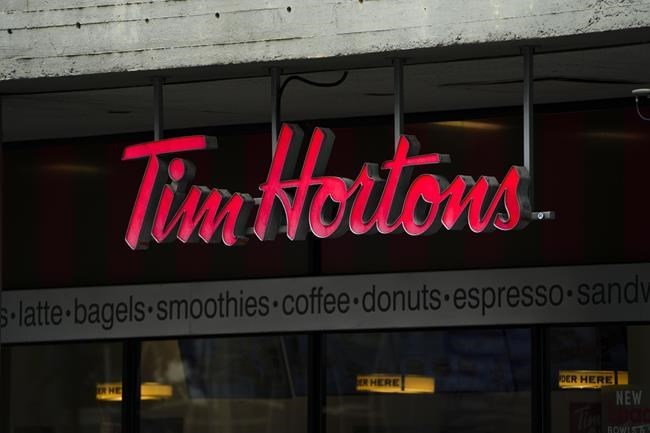TORONTO ÔÇö A former Domino's Pizza CEO is now the executive chair of Tim Hortons' parent company as the fast-food giant focuses on boosting sales and its stock amid economic headwinds.
Restaurant Brands International Inc., which also owns Burger King, Popeyes and Firehouse Subs, said Wednesday that Patrick Doyle had been immediately appointed to the senior role.
"I love the restaurant industry. These are four exceptional brands with real opportunities for accelerated growth," said Doyle, in a statement.
"I am confident we can create one of the most compelling growth stories in the industry."
Doyle was chief executive at Domino's Pizza from 2010 to 2018 and succeeded Daniel Schwartz and Alex Behring, who were co-chairs at RBI and will continue to serve on the company's board of directors.
Doyle's new role will come with an equity package of two million options granted at fair market value and vesting in five years, 500,000 restricted share units vesting over roughly the same period and 750,000 performance share units that will pay out if RBI meets targets.
Doyle's appointment comes as quick-serve restaurants are facing a massive labour crunch, worker demands for higher wages and supply chain challenges, including higher food costs, a lettuce shortage and inflation levels not seen in decades.
At the same time, they are grappling with customers who have not returned to the office five days a week and are thus, not taking as many coffee breaks or buying lunches as frequently.
Sales at downtown Tim Hortons locations alone were about five per cent below 2019 levels in the company's most recent quarter ÔÇö an improvement compared with a roughly 40 per cent drop during the pandemic.
In response to the economic headwinds and shifting consumer habits, Tim Hortons has been fine tuning prices and calling for the government to provide more flexibility for companies accessing foreign labour.
RBI is hoping Doyle can help the company get through the economic conditions and reinvigorate the business' 29,000 restaurants. 
The company said it went with Doyle because at Domino's he led "one of the restaurant industry's most successful transformations by focusing on putting the guest experience first and being the best at digital ordering and food quality."
Doyle delivered 29 consecutive quarters of same store sale increases, system-wide sales growth jumped from $5.6 billion to $13 billion on his watch and he created $11 billion in shareholder value and increased the share price more than 23 times, bringing it from nearly $12 in March 2010 to $271 in June 2018, RBI pointed out. 
But some feel RBI should temper its expectations. 
"His time at Dominos was during an economic upturn. So far, he hasn't proven his abilities during an economic downturn," said Joanne McNeish, a Toronto Metropolitan University professor specializing in retail marketing, in an email.
She suspects Doyle will have to pay attention to raising prices, products that may or not fit to the Canadian palate and the higher customer wait times that come with fewer employees.   
Quick-service restaurant growth is also likely to come under pressure generally.
"The closer we get to full recovery of the food service visits lost during the pandemic, the slower growth will be," said Vince Sgabellone, a food service analyst at the NPD Group research firm, in a statement. 
McNeish said Tim Hortons' current growth seems to be coming from new stores and international locations, but sa╣·╝╩┤½├¢ is still responsible for most of the revenue.
"I can see why they brought in someone who has experience in turning around another restaurant chain," she said.
"However, I think that Doyle reflects the continued Americanization of Tim Hortons." 
RBI chief executive Jose Cil said in a statement that he was "excited" to work with Doyle.
With Doyle on board, Cil said the company will "rapidly accelerate growth in the company and deliver on plans that result in exceptional service for our guests; and excellent returns for our franchisees and for all shareholders."
Franchisee relations have been a sore spot for RBI in the past. In the years leading up to the pandemic, it had several public spats with franchisees over cost-cutting measures, delays in supply deliveries and a $700-million renovation plan the company said would cost store owners $450,000 per restaurant.
Yet the company's share price did not plummet amid the strife. It hovered between $70 and $90 for the last five years.
It rose almost seven per cent to $84.57 in mid-morning trading Wednesday on news of Doyle's appointment and his plans to purchase 500,000 RBI shares. The shares will have a value of about $30 million and Doyle has promised to hold them for at least five years.
This report by The Canadian Press was first published Nov. 16, 2022.
Companies in this story: (TSX:QSR)
Tara Deschamps, The Canadian Press



